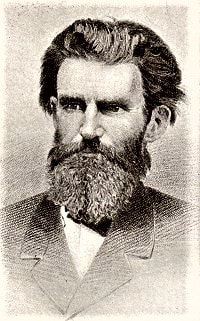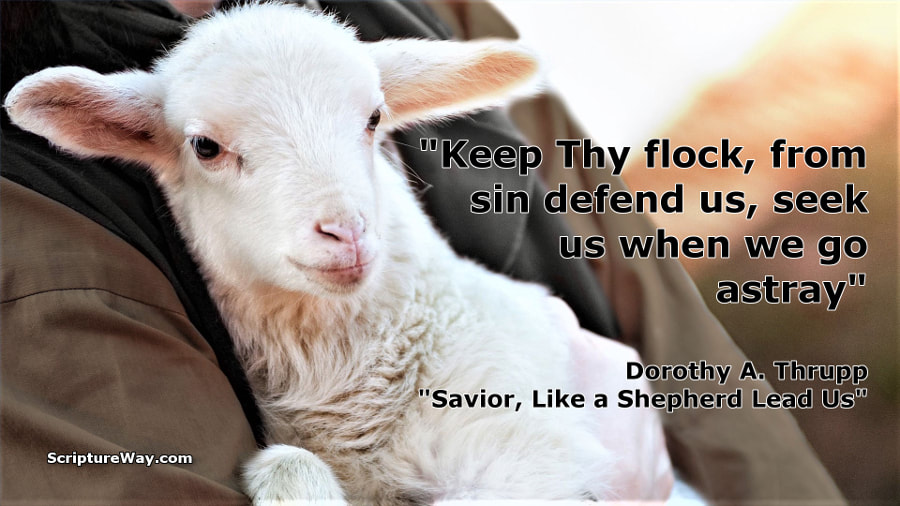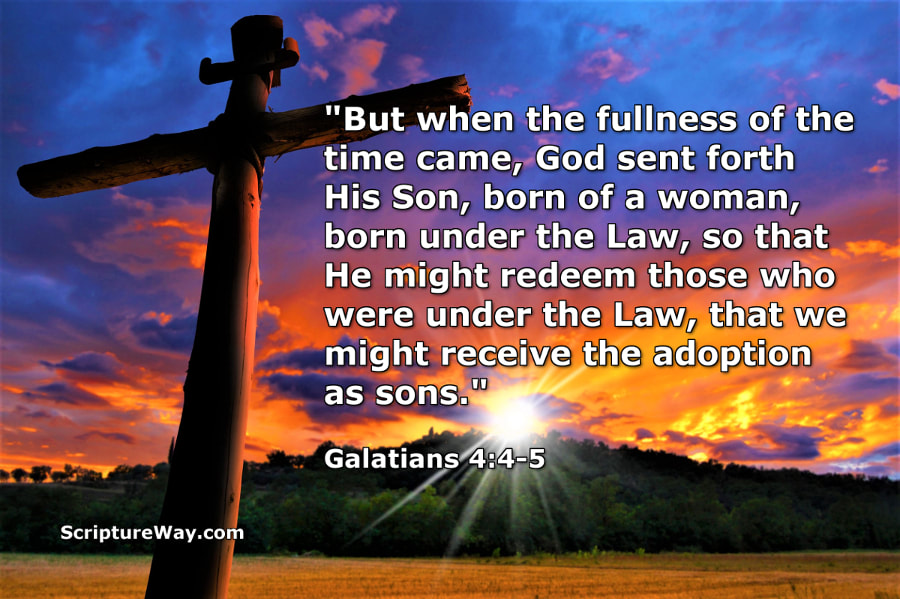"In him we have redemption through his blood, the forgiveness of our trespasses, according to the riches of his grace ..." (Ephesians 1:7)
This lesson explains the biblical definition of redemption, that Jesus Christ has paid the price for our redemption, and that our redemption is a free gift from God.
Consider. Think for a moment. How would you define redemption in your own words? How would you explain your redemption through Christ to an inquisitive unbeliever or a new Christian?
1. Redemption is the action of buying back or repurchasing what was previously forfeited or lost.
The transliteration of the Greek word for redemption in Ephesians 1:7 is apolutrosis (ap-ol-oo'-tro-sis) (Ref. 1). HELPS Word-studies states that apolutrosis (redemption) literally means buying back from, repurchasing what was previously forfeited (or lost) (Ref. 1). Jesus said, "For the Son of Man came to seek and to save the lost" (Luke 19:10).
In the New Testament, the primary idea in redemption is deliverance from bondage, specifically the bondage of sin (John 8:34-36, Ref. 2). "Into that bondage man has plunged himself; God’s mercy redeems him from it at an unspeakable price" (John 3:16, 1 Peter 1:17-19, Ref. 2). 2. Redemption is effected by the payment of ransom. Jesus Christ has paid the ransom price -- his blood -- for our redemption.
The Strong's Concordance definition of apolutrosis (redemption) is a release effected by payment of ransom (Ref. 1). The transliteration of the Greek word for ransom is lutron (loo'-tron), which literally is the ransom money (price) to free a slave (Ref. 3, HELPS Word-studies). Jesus Christ has paid the lutron, the ultimate "liberty price" -- the blood of Christ -- to purchase (ransom) believers, freeing them (us) from all slavery (bondage) to sin (Ref. 3). Jesus said, "For even the Son of Man came not to be served but to serve, and to give his life as a ransom for many" (Mark 10:45).
Consider these cross references: 1 Peter 1:18-19 -- "Know that you were redeemed from your empty way of life inherited from the fathers, not with perishable things like silver or gold, 19 but with the precious blood of Christ, like that of a lamb without defect or blemish." Hebrews 9:11-12 -- "But when Christ appeared as a high priest of the good things having come, He entered through the greater and more perfect tabernacle, not made by hands, that is, not of this creation; 12 and not through the blood of goats and calves, but through His own blood, He entered the holy place once for all time, having obtained eternal redemption." 3. According to Ephesians 1:7, we (believers in Christ) have redemption through the blood of Christ and the forgiveness of our trespasses according to the riches of God's grace.
Strong's Concordance defines grace as a gift or blessing brought to man by Jesus Christ (Ref. 4). Thus, our redemption by Jesus Christ is a free gift from God to us, believers in Christ, according to the riches [abundance] of God's grace (Ephesians 1:7, Ref. 5).
Even though God's grace-full gift of redemption to us was free, that free gift of redemption was immensely costly to God (John 3:16, 1 Peter 1:18-19). Summary - the Main Principles in this Lesson:
1. Redemption is the action of buying back or repurchasing what was previously forfeited or lost.
2. Redemption is effected by payment of ransom. Jesus Christ has paid the ransom price -- his blood -- for our redemption. 3. We (believers in Christ) have redemption through the precious blood of Christ and the forgiveness of our trespasses according to the riches of God's grace. Redemption is a free gift from God to us. 4. Although our redemption by God is a free gift from God to us, that free gift was immensely costly to God -- it cost the precious blood of God's only Son, Jesus Christ.
Apply. How will you purpose to live today and each day in light of your redemption by Jesus Christ, God's Son? Give thanks for God's gracious gift of redemption.
6 Comments
Photo source: FreeBibleImages.org "How think ye? If a man have an hundred sheep, and one of them be gone astray, doth he not leave ninety and nine, and go into the mountains, and seek that which is gone astray?" (Matthew 18:12 1599 Geneva Bible) This article describes the scripture allusions for verse 2 of the children's hymn, "Savior, Like a Shepherd Lead Us." In verse 2 the hymn teaches us that Jesus befriends us, guards our way, keeps watch over us, defends us from sin, and seeks us when we go astray. In the first article in this series, Ref. 1, we learned about the background for the hymn text author, Dorothy A. Thrupp, and the hymn tune composer, William B. Bradbury. We also discussed the Biblical truths in verse 1 - that Jesus is our great Shepherd who leads us, cares for us, feeds us, and protects us. Jesus has redeemed us ("bought us"), and we belong to him (Ref. 1). Consider. At what time or times in your life did Jesus seek you when you had gone astray? In what ways does Jesus guard you and defend you from sin? Verse 2 for "Savior, Like a Shepherd Lead Us" "We are Thine, Thou dost befriend us, be the Guardian of our way; Keep Thy flock, from sin defend us, seek us when we go astray. Blessed Jesus, blessed Jesus! Hear, O hear us when we pray. Blessed Jesus, blessed Jesus! Hear, O hear us when we pray." -- Dorothy A. Thrupp (1779-1847, Ref. 2) To see the lyric sheet for all four verses of "Savior, Like a Shepherd Lead Us" on one page, click here. The lyrics are provided by Timeless Truths (Ref. 3). The Bible verses cited below are linked to the BibleGateway.com website and are quoted from the English Standard Version (ESV) unless noted otherwise (Ref. 4). Scripture Allusions - Verse 2 "We are Thine, Thou dost befriend us, be the Guardian of our way" This first line in verse 2 declares that we belong to Jesus, that he befriends us, and then asks Jesus to guard our way. We are Thine. We now belong to Jesus because he has redeemed us. The Apostle Paul wrote to Titus about "our great God and Savior, Christ Jesus, who gave Himself for us to redeem us from every lawless deed, and to purify for Himself a people for His own possession, zealous for good deeds" (Titus 2:13-14 NASB). This phrase, "We are Thine," continues the theme of redemption that the author stated at the end of verse 1 (Ref. 1, Ref. 3). Thou dost befriend us. Not only has Jesus given his life in the past to show us that he is our friend (John 15:13), he also loves us and treats us with close personal affection now in the present (Ref. 5). Jesus told his disciples, and he tells us who believe in him and follow him now, "I have called you friends" (John 15:15). Because Jesus is our Friend and we are his friend we love him and we keep his commandments (John 14:15, John 15:14). Be the Guardian of our way. In this phrase, we ask Jesus to be our spiritual "guard rails" and keep us on the right path. Jesus said, "When the Spirit of truth comes, he will guide you into all the truth, for he will not speak on his own authority, but whatever he hears he will speak, and he will declare to you the things that are to come" (John 16:13, Ref. 6). "Keep Thy flock, from sin defend us, seek us when we go astray." The three phrases in this line continue the image of the good Shepherd and what he does to protect his flock, his sheep. All three phrases are in prayer-like language. Keep Thy flock. In the phrase, "keep Thy flock," we ask Jesus, our Shepherd, to guard and protect us with personal interest and vigilance (Ref. 7). We learn the meaning of "keep" from a famous verse about the birth of the Savior. "And in the same region there were shepherds out in the field, keeping watch over their flock by night" (Luke 2:8). The Greek word in Luke 2:8 for keeping means guarding, protecting, and exercising unbroken vigilance (Ref. 7). From sin defend us. Jesus defends us from sin through the word of God and the Holy Spirit whom he has sent to indwell those who believe in Christ. Jesus said, "But the Helper, the Holy Spirit, whom the Father will send in my name, he will teach you all things and bring to your remembrance all that I have said to you" (John 14:16). David described the importance of memorizing and remembering scripture so he could apply it to guard himself from sin (Psalm 119:9-11). Jesus remembered and quoted scripture to defend himself from the devil when the devil tempted him (Matthew 4:1-11). The Apostle Paul instructed believers about the importance of the word of God coupled with truth and faith to "extinguish all the flaming darts of the evil one" (Ephesians 6:13-17). Seek us when we go astray. When we go astray (off course), Jesus will come looking for us. Jesus said, "How think ye? If a man have an hundred sheep, and one of them be gone astray, doth he not leave ninety and nine, and go into the mountains, and seek that which is gone astray?" (Matthew 18:12 1599 Geneva Bible). The Greek word for astray (used twice in this verse) means "get off-course; to deviate from the correct path (circuit, course), roaming into error, wandering; (passive) be misled" (Ref. 8). Note the interesting parallel in Genesis when the Lord God came walking in the garden seeking Adam and Eve after they had sinned (Genesis 3:8-9). "Blessed Jesus, blessed Jesus! Hear, O hear us when we pray." (Phrase repeated) The hymn text reminds us to pray in child-like trust to our Savior who protects us, defends us, and seeks us when we go astray. The request to God, "Hear my prayer," is common in the Psalms. David prayed, "O God, hear my prayer; give ear to the words of my mouth" (Psalm 54:2). "Hear my prayer, O Lord; give ear to my pleas for mercy!" (Psalm 143:1). John the disciple of Jesus wrote to believers in Christ, "I write these things to you who believe in the name of the Son of God, that you may know that you have eternal life. And this is the confidence that we have toward him, that if we ask anything according to his will he hears us" (1 John 5:13-14, italics added). Listen and Sing Along Click on this YouTube link - Solo piano meditation on the hymn "Savior, like a Shepherd Lead Us" with sing-along lyrics. Recorded by Rick Betts - March, 2011. Prayer Thank you, Jesus, for seeking us and finding us when we have gone astray. Thank you, Good Shepherd, for leading us and guarding us in the way that leads to eternal life (John 10:27-28). References
1. http://www.scriptureway.com/home/savior-like-a-shepherd-lead-us-scripture-allusions-verse-1 2. https://en.wikipedia.org/wiki/Dorothy_Ann_Thrupp 3. https://library.timelesstruths.org/music /Savior_Like_a_Shepherd_Lead_Us/ 4. https://www.biblegateway.com/ 5. https://biblehub.com/greek/5384.htm 6. http://www.scriptureway.com/home/the-spirit-of-truth 7. https://biblehub.com/greek/5442.htm 8. https://biblehub.com/greek/4105.htm
"The Lord is my shepherd; I shall not want. He makes me lie down in green pastures. He leads me beside still waters. He restores my soul. He leads me in paths of righteousness for his name's sake." (Psalm 23:1-3) "I am the good shepherd." (John 10:11, 14) This article describes the author background and then the scripture allusions for verse 1 of the hymn, "Savior, Like a Shepherd Lead Us." This article is the first in a series on this theologically-rich children's hymn. Reference 2 describes the scripture allusions in verse 2 of "Savior, Like a Shepherd Lead Us." Hymn Text Author Researchers do not know for sure the circumstances about how the text for "Savior, Like a Shepherd Lead Us" was written; however, researchers attribute this beloved hymn of the Christian faith to Englishwoman Dorothy Ann Thrupp (1779-1847) (Ref. 3, Ref. 4). Miss Thrupp is "particularly remembered as a writer of hymns for children" (Ref. 4). "Savior, Like a Shepherd Lead Us" first appeared unsigned (unattributed) in her collection, Hymns for the Young, in 1836 (Ref. 4). Ms. Thrupp wrote this hymn for teaching young children the message of a "caring Christ who loves all his children" (Ref. 3).  William B. Bradbury (Ref. 6) William B. Bradbury (Ref. 6) Hymn Tune Composer William Batchelder Bradbury (1816-1868) was an American musician who composed the tune in 1859 most often associated with "Savior, Like a Shepherd Lead Us" (Ref. 3, Ref. 5 below, Ref. 6). He named the tune "Bradbury" after himself (Ref. 3, Ref. 5). Mr. Bradbury "modified the original words meant for children and broadened the meaning to include all the congregation" (Ref. 3). Mr. Bradbury also composed the tunes to many popular hymns including "Jesus Loves Me," "He Leadeth Me," and "My Hope is Built" (Ref. 6). In addition to being an excellent musician and composer, Mr. Bradbury served as a music educator, choir leader, organist, and was a devoted reader of the Bible (Ref. 7, Ref. 8). All of the Bible verses below are linked to the BibleGateway.com website (Ref. 9). The verses below are quoted from the English Standard Version (ESV) unless noted otherwise. To see the lyric sheet for all four verses of "Savior, Like a Shepherd Lead Us" on one page, click here. The lyrics are provided by Timeless Truths (Ref. 10). Scripture Allusions - Verse 1 The first verse of this great hymn teaches children that Christ is our great Shepherd who leads us, cares for us, feeds us, and protects us. The verse also explains that Christ has redeemed us and that we are his possession. "Savior, like a shepherd lead us, much we need Thy tender care" The Lord is our Shepherd who leads us and cares for us. Psalm 23:1-3 -- "The Lord is my shepherd; I shall not want. (2) He makes me lie down in green pastures. He leads me beside still waters. (3) He restores my soul. He leads me in paths of righteousness for his name's sake." Psalm 23:5 -- "You prepare a table before me in the presence of my enemies; you anoint my head with oil; my cup overflows." Isaiah 40:11 (KJV) -- "He shall feed his flock like a shepherd: he shall gather the lambs with his arm, and carry them in his bosom, and shall gently lead those that are with young." John 10:11 -- "I am the good shepherd." (also John 10:14) "In Thy pleasant pastures feed us, for our use Thy folds prepare." The Lord feeds us in pleasant pastures and protects us. Ezekiel 34:14 (KJV) -- "I will feed them in a good pasture, and upon the high mountains of Israel shall their fold be: there shall they lie in a good fold, and in a fat pasture shall they feed upon the mountains of Israel."  Permanent Sheepfold Enclosure - Holy Land. Photo Copyright David Padfield. Used under license. Photo source: FreeBibleImages.org. Permanent Sheepfold Enclosure - Holy Land. Photo Copyright David Padfield. Used under license. Photo source: FreeBibleImages.org. A fold was a walled in, hedged, or fenced place for keeping and protecting sheep or other livestock (Ref. 11, Numbers 32:24 KJV). Jesus referred to such a sheepfold in John 10:1 (KJV). "Truly, truly, I say to you, he who does not enter the sheepfold by the door but climbs in by another way, that man is a thief and a robber." Jesus not only is the means of access to the fold; he also is the Shepherd who protects the sheep in the fold with his own body at the door. "I am the door. If anyone enters by me, he will be saved and will go in and out and find pasture" (John 10:9, Ref. 12). "Blessed Jesus, blessed Jesus! Thou hast bought us, Thine we are." (Phrase repeated) The phrase, "Thou hast bought us, Thine we are," explains to children the meaning of redemption. HELPS Word-studies defines redeem as "to release (set free) by paying the full ransom"; (figuratively) to restore "something back, into the possession of its rightful owner" (Ref. 13). Christ has purchased us and now we are his possession. Titus 2:13-14 (italics added) -- " ... waiting for our blessed hope, the appearing of the glory of our great God and Savior Jesus Christ, who gave himself for us to redeem us from all lawlessness and to purify for himself a people for his own possession who are zealous for good works." 1 Peter 1:18-19 (KJV) -- "Forasmuch as ye know that ye were not redeemed with corruptible things, as silver and gold, from your vain conversation received by tradition from your fathers; But with the precious blood of Christ, as of a lamb without blemish and without spot." Listen and Sing Along Click on this YouTube link - Solo piano meditation on the hymn "Savior, like a Shepherd Lead Us" with sing-along lyrics. Recorded by Rick Betts - March, 2011. Prayer Thank you, Jesus, for being my Savior and Shepherd. Thank you for leading me and for all the ways that you care for me. References
1. http://diglib.library.vanderbilt.edu/act-imagelink.pl?RC=48288 2. http://www.scriptureway.com/home/savior-like-a-shepherd-lead-us-scripture-allusions-verse-2 3. https://www.umcdiscipleship.org/resources/history-of-hymns-savior-like-a-shepherd-lead-us 4. https://en.wikipedia.org/wiki/Dorothy_Ann_Thrupp 5. The United Methodist Hymnal, The United Methodist Publishing House, 1989 6. https://en.wikipedia.org/wiki/William_Batchelder_Bradbury 7. https://www.wholesomewords.org/biography/bbradbury.html 8. http://www.hymntime.com/tch/bio/b/r/a/d/bradbury_wb.htm 9. https://www.biblegateway.com/ 10. Reference 10 begins next line https://library.timelesstruths.org/music/Savior_Like_a_Shepherd_Lead_Us/ 11. https://www.biblegateway.com/resources/encyclopedia-of-the-bible/Fold 12. http://www.ScriptureWay.com/home/jesus-is-the-door 13. https://biblehub.com/greek/3084.htm
"But when the fullness of the time came, God sent forth His Son, born of a woman, born under the Law, so that He might redeem those who were under the Law, that we might receive the adoption as sons. Because you are sons, God has sent forth the Spirit of His Son into our hearts, crying, 'Abba! Father!' Therefore you are no longer a slave, but a son; and if a son, then an heir through God." (Galatians 4:4-7)
This lesson is the fourth and final lesson in the series about the "Children of God" (Ref. 1, Ref. 2, Ref. 3). This article explains the nature and benefits of our adoption as children of God. This article also describes the Roman adoption process. If you are not sure that you are a child of God, please refer first to the article, "Becoming a Child of God" (John 1:12-13, Ref. 1).
Consider. As an adopted child of God, how would you describe your relationship with your heavenly Father? What do you consider to be the benefits of being a child of God?
Definition of Adoption
Let's begin by examining the definition of adoption. The Merriam-Webster.com Dictionary defines adopt as "to take by choice into a relationship, especially: to take voluntarily (a child of other parents) as one's own child" (Ref. 4).
The Greek word for adoption in the New Testament is huiothesia (Ref. 5). The word huiothesia is a combination of two words, hyiós ("son") and títhēmi ("to place") – "properly, sonship (legally made a son); adoption" (Ref. 5). The word adoption (huiothesia) occurs five times in the New Testament (Romans 8:15, Romans 8:23, Romans 9:4, Galatians 4:5, Ephesians 1:5, Ref. 5). Roman Adoption - Process
In ancient Rome, adoption of boys was a fairly common procedure, particularly in the upper senatorial class (Ref. 6). Every senator's duty was to produce sons to inherit the estate, family name, and political tradition. Roman families typically restricted their families to three children. For families with too many sons and the ones with no boys at all, adoption was the only solution (Ref. 6). Augustus, the first emperor of the Roman Empire, is possibly the most famous example of an adopted son in ancient Rome (Ref. 6, Luke 2:1).
In Roman society, accomplishing an adoption began with the process where the father sold his child to the adopting father twice and bought back his child twice. On the third sale of the child, the "selling" father did not buy back the child. The adopting father went to the Roman magistrate and made the case for the child to become part of his family and to be under his protection. When the magistrate approved, the adoption was complete (Ref. 7). Roman Adoption - Benefits
William Barclay's Daily Study Bible (Ref. 7) describes below the benefits for the adopted person in ancient Rome.
Now let's turn our attention to the scriptures that the Apostle Paul wrote about the nature and benefits of our adoption as children of God.
God Planned in Advance for Our Adoption
Our adoption as God's children was God's idea and God's initiative. Paul wrote about God the Father, "He chose us in Him before the foundation of the world, that we would be holy and blameless before Him. In love He predestined us to adoption as sons through Jesus Christ to Himself, according to the kind intention of His will ..." (Ephesians 1:4-5, italics added). The Greek word for predestine is proorizó, which means to pre-establish boundaries or to mark out beforehand (Ref. 10).
Our Adoption as God's Children is Made Possible through the Redeeming Work of God's Son, Jesus Christ
"But when the fullness of the time came, God sent forth His Son, born of a woman, born under the Law, so that He might redeem those who were under the Law, that we might receive the adoption as sons" (Galatians 4:4-5, italics added). The Greek word for redeem is exagorazó, which means buy away from, purchase out from, or rescue from (Ref. 11).
The redeeming work of Christ has provided us (who believe in him) these benefits:
Apply. In prayer, thank God for planning for your adoption and reaching out to redeem you through the saving work of His Son, Jesus Christ. Thank God for giving you his blessings and favor as a child of God. Thank God for providing you an inheritance - eternal life.
Related Topics
"Becoming a Child of God" (John 1:12-13) "Characteristics of a Child of God - Part 1" (Matthew 7:16) "Characteristics of a Child of God - Part 2" (Matthew 5:16)
References
1. http://www.ScriptureWay.com/home/becoming-a-child-of-god 2. http://www.ScriptureWay.com/home/characteristics-of-a-child-of-god-part-1 3. http://www.ScriptureWay.com/home/characteristics-of-a-child-of-god-part-2 4. https://www.merriam-webster.com/dictionary/adopt 5. https://biblehub.com/greek/5206.htm 6. https://en.wikipedia.org/wiki/Adoption_in_ancient_Rome 7. https://www.studylight.org/commentaries/dsb/romans-8.html (public domain) 8. https://biblehub.com/commentaries/cambridge/galatians/4.htm 9. https://www.jstor.org/stable/1322384?seq=4#metadata_info_tab_contents 10. https://biblehub.com/greek/4309.htm 11. https://biblehub.com/greek/1805.htm 12. https://biblehub.com/greek/5.htm 13. https://biblehub.com/commentaries/pulpit/galatians/4.htm 14. http://www.ScriptureWay/home/what-is-eternal-life |
Daily Bible Verse(Click the link above) AuthorMr. Whitney V. Myers. Christian. For more information, please visit the Author Page. Posting ScheduleI plan to provide new postings about once a month. Planned Topics(subject to change) Recent Posts(most recent three months) Popular Posts(top 10) Categories
All
Archives
July 2024
|
|
Copyright 2018-2024 Whitney V. Myers |
Listed in Feedspot's Top 100 Bible Study Blogs and Websites |




 RSS Feed
RSS Feed
